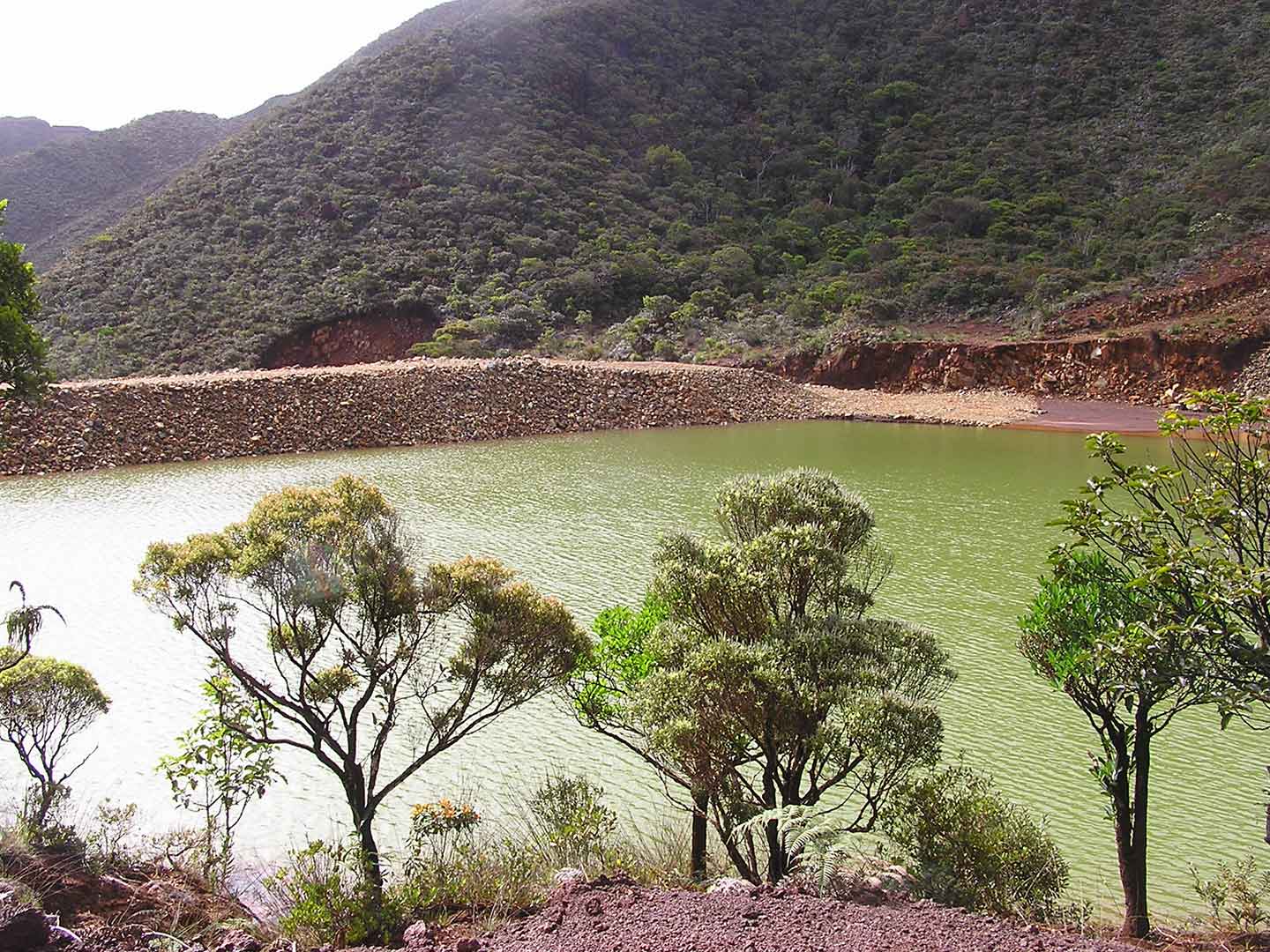Extraction of mainly saprolite ore, with smaller quantities of laterite. NMC should be able to supply around 3 to 3.5 million tonnes of ore to the SNNC plant. In 2023, production was 2.9 million tonnes of ore shipped.
Four operational mining centres located in the North Province at Ouaco (Kaala-Gomen) and Poya on the west coast, and at Nakety (Canala) and Kouaoua on the east coast. The administrative headquarters, maintenance centre, laboratory and main support services are located in Noumea.
702 at 31 December 2023.
Address: 24 rue Baie de Koutio – Ducos
P.O. Box 66 – 98845 Nouméa Cedex
New Caledonia
Phone: +687 28 31 71
Website: https://nmc.nc
NMC, extracting New Caledonian nickel to supply a New Caledonian plant in South Korea, is the aim of the SMSP-POSCO partnership between the two companies, NMC and SNNC.
Under this partnership, NMC’s mission is to supply the SNNC plant with 3.6 million tonnes of wet ore per year, at a grade of around 2%.
NMC must also ensure to produce a certain chemical composition of the ore shipped, which requires the blending of ore from the East Coast sites (Kouaoua and Nakéty) and the West Coast sites (Poya and Ouaco).
The NMC joint venture, whose capital is held by SMSP and POSCO, is managed by a joint management board made up of six members, three of whom are appointed by SMSP and three by POSCO.
Because of the scattered nature of the sites, the company is organised on a site-by-site basis, with a Centre Manager at the head who reports directly to the Operations Director. The other departments such as HR, accounting, HS, etc. appoint their referents at each mining site.
The nickel ore located on the surface of the mountain massifs is mined in open-cast pits. NMC holds mining rights on 4 sites in New Caledonia:
On the East Coast at Yaté, NMC also operates two smaller sites, N’Go and Gémini.
NMC’s administrative headquarters are located in Ducos, in Noumea, the capital of the Southern Province and New Caledonia’s most populous city.

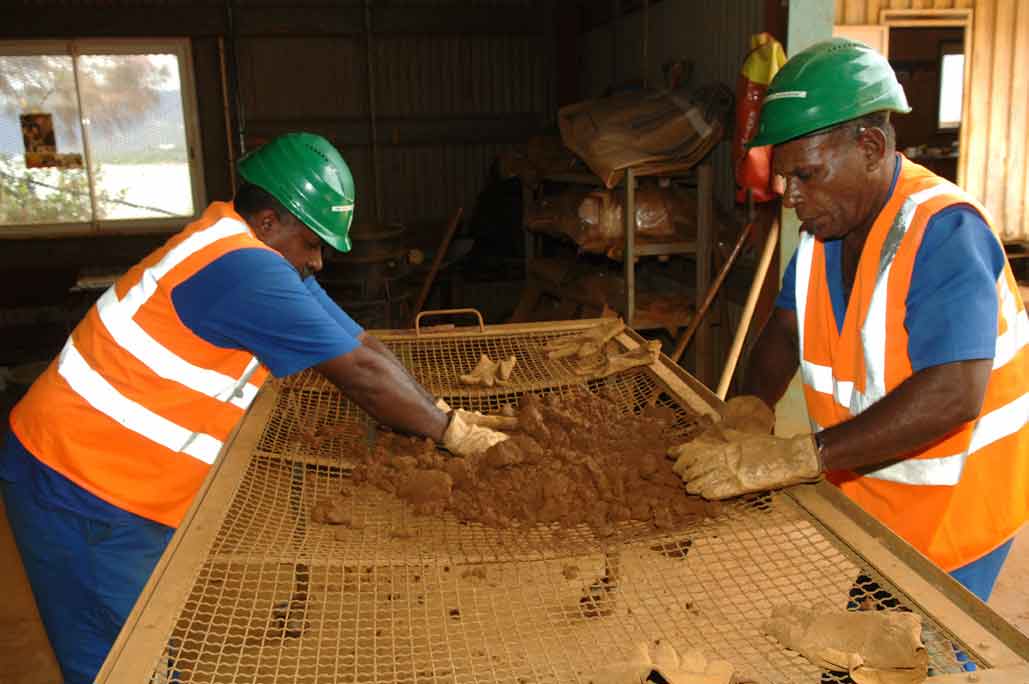
PROSPECTING AND ASSESSMENT OF DEPOSITS
Field studies and sample collection to assess the presence and composition of resources. Drilling campaigns are then carried out and the samples sent to the laboratory to modelling the position of the deposits. Finally, mining plans are drawn up on the basis of these models, so that applications can be made for mining licences.
Waste rock dumps, tracks for machinery and vehicles, and water management structures are of course included in the operating plan, which covers several years.
MINING
Extraction of ore in stages:
Société Minière du Sud Pacifique (South Pacific Mining Company), then owned by the Lafleur family, was founded in Ouaco in 1969, where it operated a nearby mining estate belonging to SLN, of which it was the shareholder until 2000. The Ouaco Mining Centre, now operated by its NMC Subsidiary (Nickel Mining Company), has remained the company’s operational heart since its takeover by SOFINOR in 1990.
The Ouaco Centre is located on the plains of New Caledonia’s North-West Coast, in Kaala-Gomen township. It is 40 kilometres from Koumac and 65 kilometres from Koné.
The centre covers three areas:
• The historic village, which houses the management offices and secretariat, the maintenance workshops, the industrial warehouse, the laboratory and the drilling team’s dock.
• The Ouazanghou mining massifs, 20 kilometres away, and Taom, 30 kilometres away.
• Teoudié, the loading site for the ore carriers, on the seafront, also around twenty kilometres from the village.
The Poya Centre operates the Pinpin Mine, some of whose titles belong to SLN and are the subject of an exchange agreement with the SMSP Konboye N’Goye deposit in the Thio region. The development of the SMSP-POSCO partnership with the Koreans will also lead, in the coming years, to the extraction of ore from the Dent de Poya Deposit, near the SLN historical Pinpin Mine, and to the opening of a new mining site on the Boulinda Massif.
The Poya Mining Center is unique in that it straddles the North and South provinces. It lies in the middle of the west coast, halfway between the Bourail Farming Town of Bourail and the urban centre of VKP, both around fifty kilometres from the village of Poya. It encompasses:
• The Pinpin Mine, which rises to an altitude of 800 metres and is around thirty kilometres from the town and 27 kilometres from the coast.
• The Porwi ore carrier loading site, 25 kilometres from the village and the mine.
• The administrative offices.
The centre’s offices are located a dozen kilometres from the village of Kouaoua, on the road leading to Poro.
The Kouaoua Mining Centre encompasses:
• The SMMO 36 (Kadjitra) and SMMO 37 mines, reopened in 2006 for the Chinese market, located respectively 12.5 and 10 kilometres from the seafront, as well as the Claire Red Mine, which is currently put aside.
• Seaside infrastructures and facilities.
• The administrative centre and mining camp.
The NMC Nakéty Mining Centre concentrates several deposits and the seaside loading facilities in a relatively small area. The company’s deposits are located alongside domains belonging to the Ballande Group. This means that the two groups are present on the same massif and use a common stretch of track to access their respective operations. As with the company’s other sites, business at Nakéty has been sustained by the contract to supply ore to the SMSP plant in Korea.
The Nakéty Mining Centre is located on the South Coast of the bay of the same name, in Canala Township, 18 kilometres from the main town. It is located in an area of the east coast largely dedicated to mining.
It includes:
• The Edouard and Eureka Mines, 3 and 6 kilometres respectively from the shore, and the Circée Mine, 10 kilometres away.
• Seaside facilities housing the administrative offices, laboratory and loading wharf, as well as collective structures for catering and accommodation for visiting staff members.
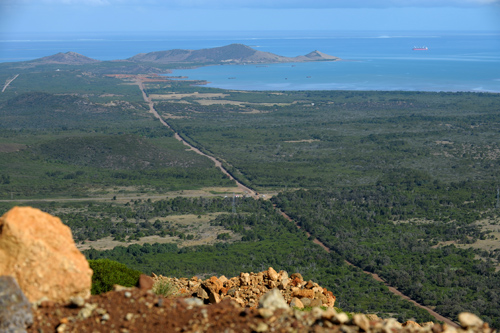
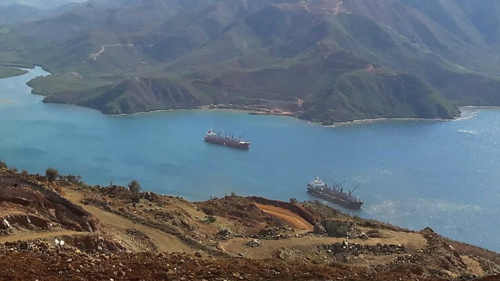
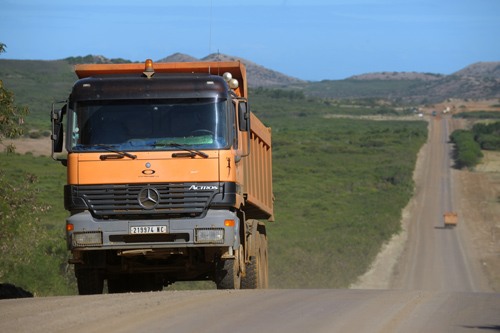
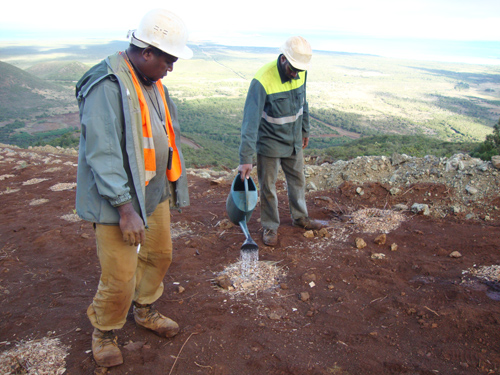
NMC is historically a company rooted in its human and specific environment, that of New Caledonia.
The company has therefore set up a Subcontracting and Economic Integration Department (DSTIE), which implements the company’s policy of social and environmental responsibility. This involves ensuring that each production site mobilises local companies for operations, as well as encouraging the development of initiative economic activities such as catering and childcare. In addition, the DSTIE provides support for the initiatives of its employees who wish, for example, to initiate their own business in the agricultural sector, or to take up a new course of study or change direction.
All these actions are carried out on an ongoing basis and combined constitute a social licence to operate the company. As part of this process, the majority of employees at the sites are first and foremost residents of the area, particularly from the surrounding tribes.
Aware of the importance of New Caledonia’s exceptional natural heritage and the many pressures on its biodiversity, NMC is committed to developing exploration, exploitation and rehabilitation techniques that respect this environment.
Among its many initiatives, NMC is wearing particular care for:
